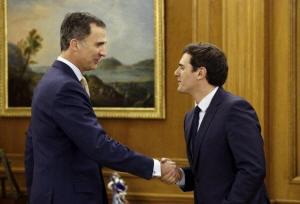|
 In
Spain, left-wing coalition seen more likely as king ends talks In
Spain, left-wing coalition seen more likely as king ends talks
 Send a link to a friend
Send a link to a friend
[January 22, 2016]
By Julien Toyer
MADRID (Reuters) - Spain will start to
find out on Friday how quickly political parties can agree on a new
government, with the prospect of a left-wing alliance now seen as
gaining ground over a potential "grand coalition" one month after an
inconclusive election.
|
|
 King Felipe will meet the leaders of Podemos, the Socialists and
the conservative People's Party (PP) - acting Prime Minister Mariano
Rajoy - to conclude five days of talks with all forces represented
in parliament. King Felipe will meet the leaders of Podemos, the Socialists and
the conservative People's Party (PP) - acting Prime Minister Mariano
Rajoy - to conclude five days of talks with all forces represented
in parliament.
He is expected to propose Rajoy, whose PP won most seats but failed
to gain an outright majority in the Dec. 20 vote, as a candidate for
prime minister shortly afterwards.
While Rajoy is set to lose the subsequent parliamentary vote on his
appointment as most parties have already said they would reject him,
the move would set the clock ticking and open a two-month maximum
period for the formation of a government or the prospect of new
elections in May.
It would also give Socialist leader Pedro Sanchez the next shot as
candidate for the job.
Sanchez opposes the "grand coalition" of center-left and
center-right parties proposed by Rajoy and wants instead to strike a
deal with leftist newcomer Podemos and other smaller groups to
obtain a majority of "progressive forces".
 That will not be easy as Podemos, which relies on strong regional
affiliates, especially in Catalonia, has pledged to organize a
referendum on the independence of the wealthy northeastern region,
which the Socialist's reject.
The two parties however softened their respective stance on the
issue earlier this week and insisted they wanted to focus on
economic and social issues rather than on the Catalan question.
"We will back any candidate who is able to generate a majority for
change in this country," said Joan Baldovi, from Compromis, a
Podemos' affiliate in the Valencia region, after meeting the king on
Thursday.
"People have voted in a clear way and what they want is that we
reach an agreement," he said.
[to top of second column] |

The fragmented election has thrust Spain into a situation
unprecedented in the four decades since the return of democracy.
The PP and the Socialists, which have alternated in power over the
last 40 years, came first and second but with greatly reduced
support.
Meanwhile, two new parties, the anti-austerity Podemos and the
centrist Ciudadanos, attracted a new generation of voters
disillusioned with the old elite.
If Sanchez fails to be voted in as prime minister, it is not clear
yet whether Rajoy would try again or the parties would directly seek
a new election within the following two months.
Ciudadanos leader Albert Rivera said on Thursday his party was ready
to abstain in favor of Rajoy or Sanchez to avoid a new election and
provide institutional stability at a time when the Spanish economy -
the European Union's fifth-largest - is recovering from its worst
crisis in decades.
A majority of Spanish voters oppose holding another election to
resolve the political stalemate and want parties to agree on a
coalition government, a survey showed on Sunday.
(Additional reporting by Blanca Gonzalez; Editing by Angus MacSwan)
[© 2016 Thomson Reuters. All rights
reserved.]
Copyright 2016 Reuters. All rights reserved. This material may not be published,
broadcast, rewritten or redistributed.
 |